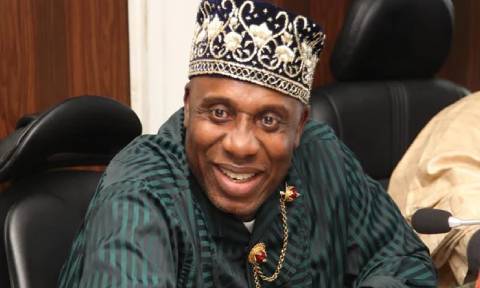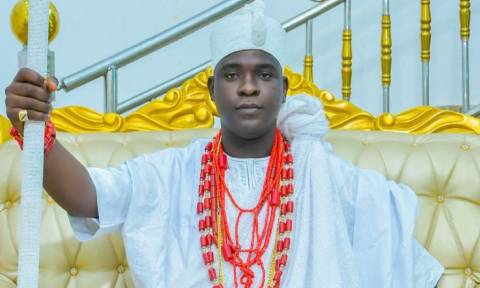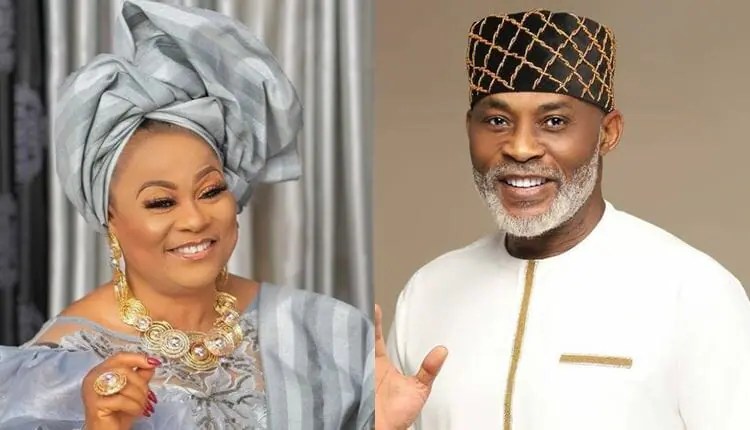
Paul Adams is a consummate artiste. He described himself as an artiste’s artiste. Starting from the days of Checkmate, Adams played a commanding role in the evolution of Nollywood till date. Currently the PRO of Actors Guild of Nigeria (AGN) Lagos Chapter, Adams traces the coming of Nollywood, the strides it has made, some not-so-pleasant aspects of the industry and declares his passion for the military as well as his foundation that is designed to help the hlpeless. Anote Ajeluorou spoke to him.
ow did you start out in Nollywood?
I’m an artiste’s artiste! By that I mean I studied Graphic Arts at Yabatech. Then I went into the television world. Before then I was on stage. I started out with Ripples way back in 1998. From then I went on to Checkmate. I was on two network programmes at the same time.
In other words, we can say you were there at the inception of Nollywood, were you?
Yes, you can say I was there, and that Nollywood didn’t just start with movies. It was television that transformed into the movies in what is today known as Nollywood. So from inception, I was there.
Did some of you foresee the transition, and therefore a natural transformation or did it surprise you when Nollywood started?
I think it was a natural consequence of events that led to it. In the sense that a child does not surprise you; it would grow to five, seven years. Indeed, we didn’t think it would become this big. However, our attention then, if you were on TV, was on celluloid because that was the format then. We had Hubert Ogunde, Eddie Ugbomah, Ola Balogun and they were doing basically 35mm. Nobody thought video would become this prominent. In fact, you can dub it a Nigerian phenomenon because in the film world, video doesn’t have a prominent place like the Cannes Festival, the Toronto film festival going on now.
To think that video would take the place it takes today, nobody saw it that way. However, God has a way of doing things. It became our way of getting into the film world.
In other words, one can safely say that television played a vital role in the emergence of Nollywood, isn’t it?
To give a proper credit where it is due, you’ll start with stage production. It was people on stage that started going onto TV way back. To the glory of God, I was privileged to be on TV as a very young person, at the age of eight or nine. We were watching TV drama, but they were nothing to write home about until Village Headmaster became very prominent. And then there were other soaps like Mirror in the Sun, Chechmate, Behind the Clouds and Cockcrow at Dawn. It is these same people that transformed to video. So the medium of experimentation was evolving, and is still evolving. I still believe that the culture of cinema is coming back to Nigeria. It gets to a point where a producer is not making money as he should for the switch to take place.
Some people have argued that the emergence of home video led to the death of stage performance. What’s your view?
No, I wouldn’t say video signified the death of stage because stage is there. I think the reason for that is, to put together a good, credible stage performance costs a lot of money. Not many individuals can come up with that sort of money these days. It depends on corporate organizations to sponsor the productions so that we can even take it round.
On the other hand, an individual can come up with money to do a movie. So there are less stage productions than there used to be. I like what Terra Kulture is doing right now. They’re awakening a greater part of stage performance. I think it is good; if we can have two or three of such efforts, then those of us who love theatre will find our way back on stage.
What’s our home of stage performance, the National Theatre doing, in your view, to revive stage?
To the best of my knowledge it’s like the government agencies that were left behind in Lagos. A lot of the functions are happening in Abuja and not in Lagos. However, the reason why theatre practitioners are fighting hard to make sure that the place is not sold out is to make sure that we have a legacy to protect. That’s where we can congregate to get a feel of what’s happening in the industry. Take Onikan, for instance, it’s not as active as it used to be. Not much is happening at the MUSON Centre in terms of stage work. But I believe that sooner or later, we’ll have more stage productions.
Corporate organizations sometimes argue that artistes don’t know how to package their shows to attract sponsorship. How true is this?
I wouldn’t say that but I wouldn’t be in the best position to tell you what is what. Everything in Nigeria, let’s hope I’m wrong, we always like taking short cut to success; in fact, a shorter cut to success. They prefer to sponsor reality shows with so-so amount and get mileage rather than spend so much money on theatre and get less. That’s what I think about those in the industry who want to support the arts; that’s what they want without too much involvement. I want to believe that’s not the real reason.
How then can those in the industry attract support from corporate organizations?
To start with, proper packaging is what I think they need. When you get credible people to package a programme, you get better results. Somebody comes up with a proper budget to say he needs five million naira to produce a programme that’ll be qualitative. Then somebody again comes and says he can do the same programme for half a million. In most cases, people like to spend less. So they ask themselves, do we have to spend more? Then they go for the cheap one. Tomorrow when it flops, because it must flop, because it was not properly packaged, you blame the entire industry for your preference for low cost. But you ignored the experts and went for amateurs; that’s the result you get for going cheap.
Just like it’s happening in home video. We have well-trained professionals, who would rather take time and cook a good dinner and make sure it’s properly cooked before it’s served. But we have people who would rather go on set for five days and say they have made a film. So it gives the industry a bad name; it gives us a bad name, not only on video or TV but also on stage.
But they have good titles they advertise at Terra Kulture for their stage production and good professionals are handling them. People should go there and have a feel of stage again. So packaging, yes, but it costs a lot to do stage. We need help here. It’s not enough to rehearse for two to three months and stage a play only in Lagos. We need money to take it round the country. It’s not encouraging for us as artistes in terms of monetary fulfillment and the satisfaction you get for work well done.
When you look back as a pioneer and see what obtains now, are you satisfied?
Without a doubt, the industry has done very well. It may not be in giant leaps. Look at the number of productions in a week. It’s not in the volume, perhaps. People know that there’s a goldmine here. People are eager to be part of the industry. It allows all comers to be part of it. It’s attracting more players and stakeholders. It’s attracting more awareness from within and outside the shores of the nation. You can’t compare the impact we are making today with the past.
Although there were fewer productions with quality impact, at the same time, you can say the story is different.
That takes us to the issue of standards in terms of technical depth. Can we get it right?
We can still say that the industry has grown. In time past, look at the kind of equipment we were using. We were shooting on VHS camera. We have improved on sound. People are aware that these things are improving. Quality then when we started and now have gone up. Now it’s DV camera for better pictures.
The only area where I have quarrel with our works is the area of content. In terms of growth and development, I like to concentrate on equipment; we have moved forward. There’s the awareness about expertise. Content is my problem. Sometimes, the interpretation is a problem. I don’t really like talking about it but we all become victims of it sometimes. Usually, the producers that I work with are people with listening ears, people who are open to correction, people who understand English, the same language as me. So they listen to you.
But there are the others. Sometimes they bring a script and I can’t read beyond the second line. If you point this out to them, they run away. They don’t want to listen. Some of them left at school certificate level and they write about a CEO of a company, they cannot get it right. They cannot speak the same language as a CEO. You don’t know anything about medicine, and you’re writing a script for a doctor; fine. Put down your basic ideas. Look for experts or professionals to vet the script for you to make it better.
They are usually in hurry; so, they tell you that’s the way they want it. I tell them I can’t read this script, they say ‘okay leave it’. I leave it for them because at the end of the day, viewers will not ask who wrote the script. All the mistakes will reflect on you as the actor who gave the script life. Viewers will say to you the actor, ‘you mean you actually said those words; that’s stupid – a doctor cannot think like that’. You won’t be there to say it wasn’t you. And the level we are, people still find it difficult to separate you from the character that you’re playing in a film. So if you say terrible lines, it’s you!
So, all of that come into play.
How would you rate the reward system in the industry? Are they capturing the essence of Nollywood?
In every discipline in life, there’s always mediocrity. That’s why even in scripture, Jesus gave a parable, which says that let the wheat and the thorns grow together till the time of harvest, they’ll separate the good from the bad. It happens in every discipline; it’s happening in the area of awards events. I have seen situations whereby some people just set it up to reward their friends; some people set it up to make some money because somebody wants to sponsor. Some set up and they are not willing to do the necessary work that’s involved to get the right awards.
They set up an academy and ask for works. Maybe only twenty per cent or even less of practitioners are interested in sending works, and then you use that to judge an entire industry. It you set up an academy like that, you must be prepared to go all out and acquire all the materials that have made impact, that have made noise. Then set up your academy to decide. But you find out that’s not the case.
How has Nollywood portrayed Nigeria? Its opponents say there’s voodoo, blood and so much negativity. Is this argument justifiable in the light of what the industry has done?
The impact it has made outside the country is two ways just like the impact our politics has made outside, just like the impact our image generally has made. Thank God for the advent of democracy and the hard work to repair the image of the country. In international airports, the green passport marks you out as a criminal. I heard that at one time the Ghanaian government banned our movies because they were teaching bad practices. So that’s the negative aspect.
Now, you can’t rule that out of movies. When we watch international movies, especially American movies, we see negative things, which have impacted on us negatively in terms of robberies, smartness in thinking up crime. Hostage-taking was not an original stuff with us. These things were adopted. The medium that transfers them to every part of the world fastest is the film medium.
At the same time, these things that films talk about are not non-existent. They exist among us. Ritual is a very terrible offence. Yet everyday we read in the papers of ritual killings, people arrested with human heads. These are the things films discuss. I saw Widow the other day, I was shocked. In some part of the country, they wash the body of the deceased for the widow to drink just because you want to prove that this person is guilty. By the time we see it live on TV or film, it wakes us up our senses that this thing is really true. But what is the government doing to stop such practice? They’ll tell you it’s our tradition. But it’s barbaric. When we see it on TV, we complain that it gives us negative image outside.
I think we should address the issues first at the root just like our campaign against corruption today. The anti-corruption thing is a rat race. It’s a waste of time. I see corruption as an offspring of something deeper. Just like the mother-ant is mass producing deep inside the hill and you’re busy killing ants outside. They’ll still come. It’s to go and kill the mother-ant inside. The source of corruption is indiscipline, lack of order. Until we address the issue of order, we cannot deal with corruption. We can okay, EFCC arrest this one, imprison that one; we’ll just be cutting off the branches and leaving the roots of the tree.
All right, let’s come back home. If you weren’t in the arts, where would you have been?
I’ll be a car racer in Formula 1!
Why?
I love fast cars.
Really?
Well, seriously, I loved the military! I’d have loved to be in the military.
What would have achieved, plan a coup?
I’d probably be shot. But that’s not the only thing. I love the army; I love the discipline, the way they carry out their assignments. I love to be able to be a defender of the nation…
But they lost their credibility when they dabbled into politics. Would you have liked to be associated with that kind of image?
Y
eah, I mean, how much credibility does the nation have in the first place? Yes, they lost their credibility. We should look at the root of the matter. It’s the colonial masters, who handed over to politicians, who did a bad job of it and the military came in. But they are Nigerians; so there’s the Nigerian thing in us in the way they ruled the nation. They messed up because they had to mess up.
But I love the military, maybe because I grew up close to the barracks. I had my troop to command back then during the civil war. Killing lizards with a catapult gets you promotion in my troop. I never took it seriously though. Even prophecy has come to confirm it much later. But visual art came in and took everything away ever since.
Tell us a little about your family
I’m married and have many children. I’m from Edo State but I grew up in Lagos.
As somebody from the South-South, how do you feel about events going on there?
It’s a very complex issue. But I believe we can talk our way out of it if we put our minds to it. We need dialogue. I always believed that a problem discussed is a problem half solved. The government is just waking up to set up a committee. Where have they been all along, for crying out loud, when they’re just waking up? Why would somebody from somewhere head that kind of committee? You have to feel for them. Let us give this committee a chance to do things.
But I don’t subscribe to the use of arms or kidnapping. It borders on criminality. But then these people were pushed to the brink and made to resort to the only way they felt they could be listened to. In all fairness, government would not be thinking of talking to them or holding dialogue now if it hadn’t gotten to this deadly extent.
What are you passionate about?
By the special grace of God, I’m passionate about the gospel of reaching the helpless and hopeless of the society, to give succour to such people. I’d like to be part of the Red Cross; they do what comes close to my heart. I have a foundation called Sonship Unity Foundation, modeled after Jesus Christ’s teaching of caring for your neighbour. I want to set up healing camps all over the country to assist victims of whatever kind; but we need funds to do it. Those who commit crime are hopeless; we need to reach them to give them hope and turn them away from the path of crime.
The Darfur crisis in Sudan touches me in a bad way. I want to be able to go there and touch lives there, to help the process of their healing and ending all that suffering. That’s why I have a TV programme on air right now about drug addiction. Nigeria is a transit point for drugs; we need to stem the use of illicit drugs among our youths so they could be better citizens. Drugs make people hopeless and helpless. We’re trying our best through this means to give meaning to the lives of our people. We’ll welcome every help we can get because only government cannot do it. So we need funding to achieve all these things in terms of partnership and support.



















